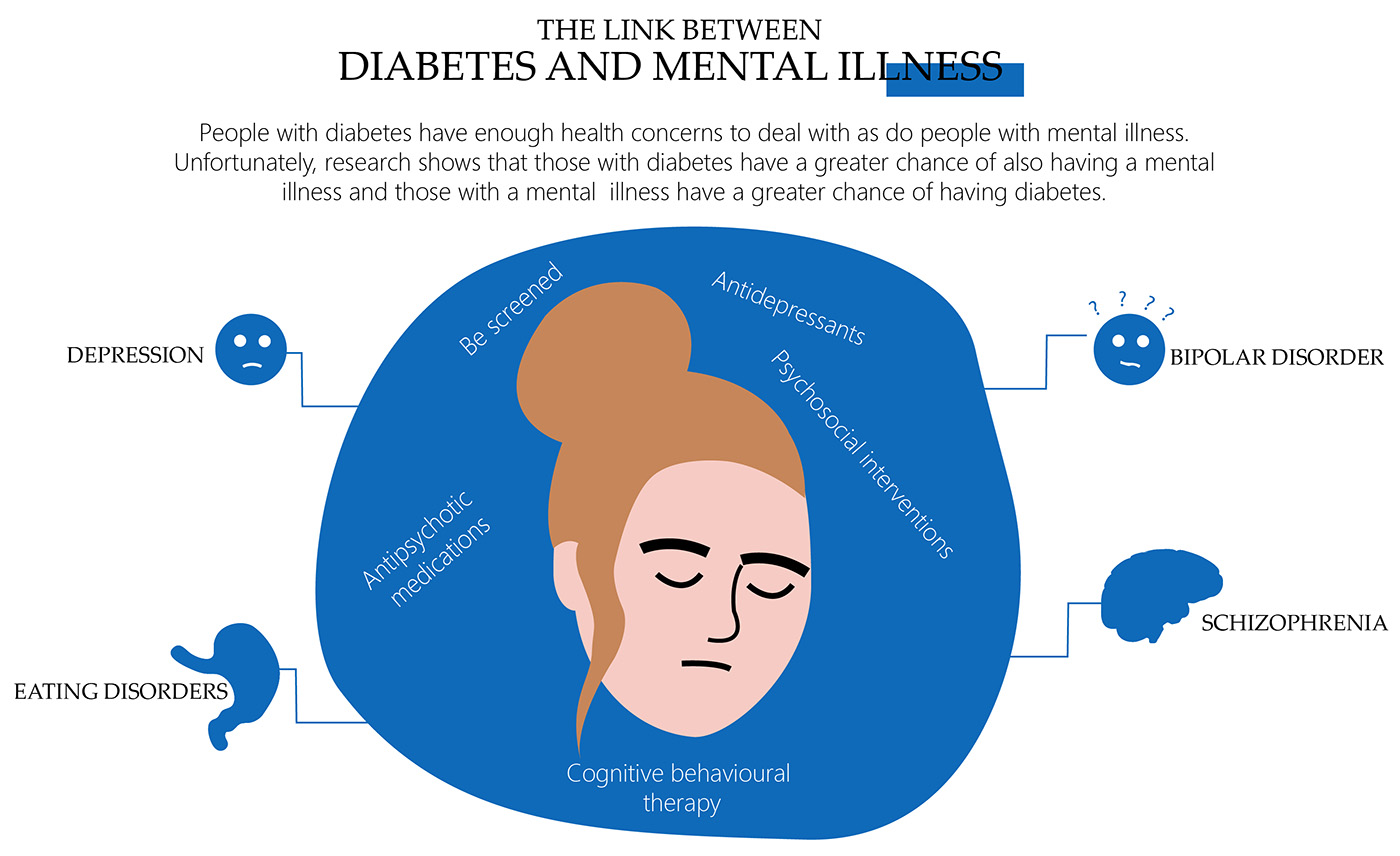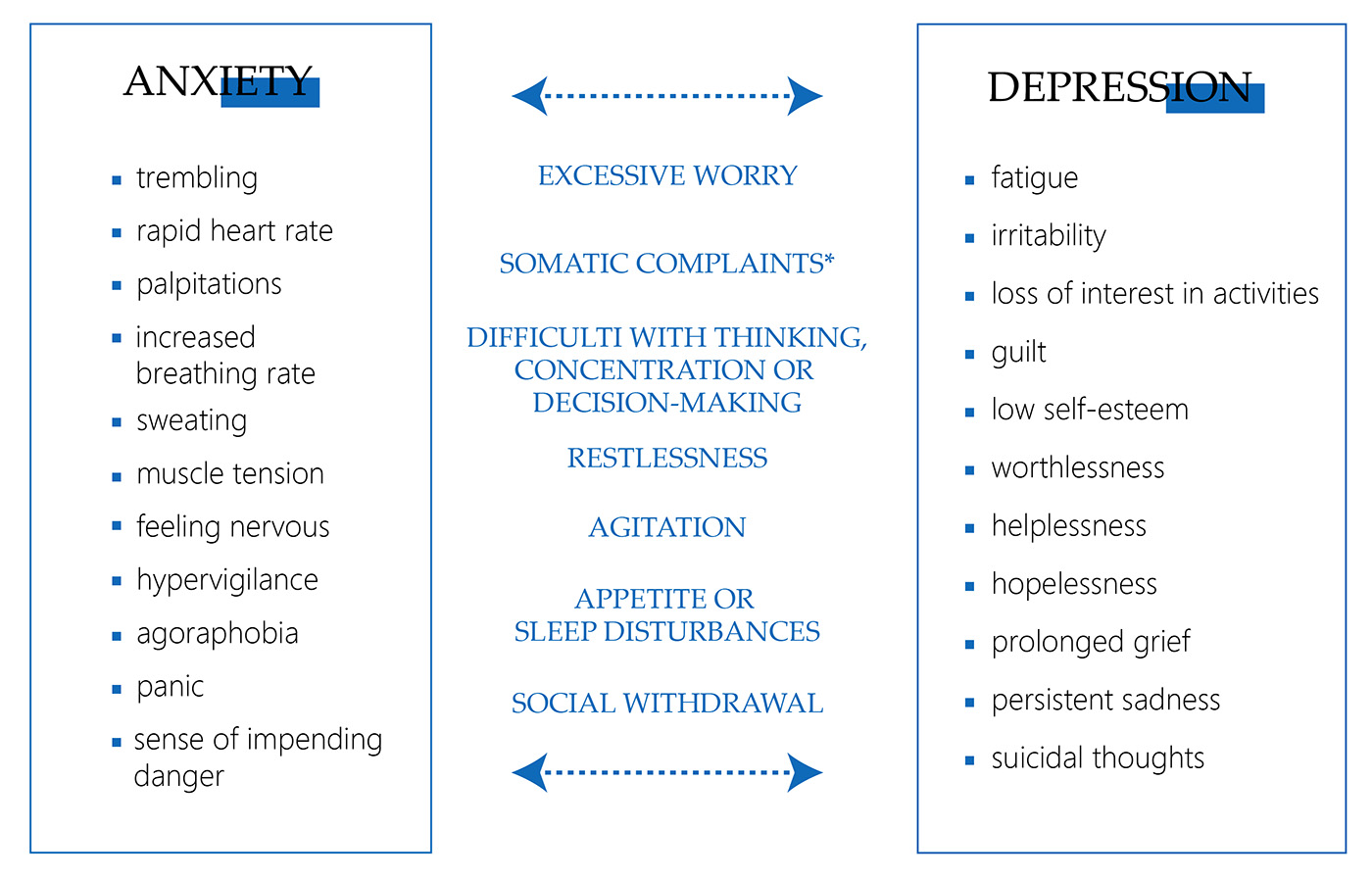Mental Health And Diabetes Type 2
Mental health awareness is a must topic for all generations' consideration. This guide will tell about the correlation between mental health and diabetes and preventive measures to deal with both.
How Does Type 2 Diabetes Affect Mental Health

If you wonder whether type 2 diabetes has effects on mental health, the answer is yes. You can experience some visible deviations in your eating habits, stress management as well as extreme tiredness. Yet, people with type 2 diabetes may vary in their mental symptoms. Learn more below.
Increased Risk for Depression
The first signal a patient may come across is the depressive changing moods. Based on one study, there was evidence that individuals diagnosed with diabetes were linked to struggle with depression 30% more than those without diabetes. It especially concerned the studied adults between 20-50 years of age. As for Type 2 Diabetes particularly, the percentage for its risk was estimated by 60% as per this study. Everything is most likely to start with stress and moderate depressive behaviors. When not treated, one may need a complex treatment protocol to avoid more fatal consequences.
Disordered Eating
Then, diabetic people are most likely to face problems with eating, including severe behaviors of binge eating or bulimia.
Bulimia
Bulimia manifests itself in eating lots of food and making a person get rid of the consumed with the help of excessive exercises or laxatives. Thus, it stops them from gaining weight.
Binge Eating
Binge eating, in turn, is also a life-threatening condition that is characterized by the following:
- A person starts eating much more than usual.
- A person eats until experiencing the uncomfortable feeling of fullness with foods.
- A person strives to eat lots of foods without experiencing hunger.
- A person may seek to eat alone lots of foods because of some kind of shyness next to other people.
- A person may start feeling disgusted after eating so many foods.
Ideally, a person should ask for relatives and friends' feedback on their eating habits to understand when treatment is necessary.
Treatment And Therapies
Nowadays in 2022, thanks to the continuously developing healthcare sector and doctors' expertise, patients with Type 2 Diabetes with accompanying mental health deviations may have designated treatments aimed at both health conditions. Yet, their efficacy may vary based on the severity and one's response to therapy. Check below what can help you today.
Therapy
As of now, the most effective and commonly assigned mental health and diabetes 2 type therapies are:
- cognitive-behavioral therapy (CBT);
- family therapy;
- dialectical-behavioral therapy (DBT).
CBT works by involving talking techniques. A patient talks to a psychologist or psychiatrist to identify the fundamental problems and build patterns to get rid of them. It is highly used for depression and anxiety events.
Family therapy improves the support and communication between family members and a patient who has mental health deviations alongside diabetes.
DBT, in turn, is a sub-type of CBT, but it is focused on treating suicidal and other self-destructive behaviors.
Medication
Another approach to deal with 2 type diabetes and mental health is the involvement of medicines. The medication regimens may also vary among patients based on the severity of their symptoms. However, they be the following:
| SSRIs (Selective serotonin reuptake inhibitors) | Zoloft, Paxil, Lexapro, Celexa, among others |
| SNRIs (Selective serotonin and norepinephrine inhibitors) | Effexor, Cymbalta among others |
| MAOIs (Monoamine oxidase inhibitors) | Nardil, Parnate, among others |
Note, all the medications mentioned above come by prescription only. A doctor will evaluate their effectiveness for one's case and determine the proper treatment. Therefore, do not self prescribe anything.
Stress Management
Finally, stress management is somehow one's sole determination to change their mental health condition accompanying diabetes. For instance, it might be Art Therapy where you draw or Music Therapy where you listen to classical music. During such stress management programs, a psychologist will be near to guide a patient.
Type 2 Diabetes Mental Symptoms
How does 2 type diabetes affect mental health particularly? Ideally, everything is diagnosed by your healthcare provider. Yet, you may also learn the common symptoms which may hint you at having depression or anxiety.
Diabetes And Mood Swings
The first signal you should think of thoroughly is sudden mood swings. Based on one study, there was evidence that patients who have inconsistent blood sugar levels were linked to poor quality of life and continuous negative moods.
A person may experience lows and highs whenever they are alone or communicate with other people. Beyond that, there might be events when a person does not feel involved in groups of people just not to become irritated or angry for no reason. You can again ask your friends or family members whether they have previously spotted such behaviors with you.
Anxiety, Depression, And Diabetes Distress
The most apparent symptoms are also anxiety and depression behaviors. However, you can also overlook the standard signals of both mental health conditions below.

Covering up all the possible type 2 diabetes mental symptoms, check the below-mentioned list as well:
- feeling extremely sad, procrastinated, or empty;
- losing any interest in your previously favorite habits;
- overeating or not wanting to eat at all;
- sleeping too much or being sleepless;
- having troubles with concentration or making decisions;
- feeling extraordinarily exhausted or tired;
- feeling hopeless, irritable, angry, anxious, or guilty;
- having recurring pains, headaches, cramps, or digestive problems.
If you believe you have any, you should immediately consult your healthcare provider to start the treatment. However, do remember the prevention of severe mental health conditions is always easier and cheaper than a complex treatment.
Tips For Coping
Now, when you are assured that Type 2 Diabetes can affect your mental health, you should know that some coping tips might come in handy. Yet, do ensure to speak about them with your doctor because their efficacy may differ for different patients.
Follow Your Diabetes Treatment Plan
Treatment of type 2 diabetes mental symptoms involves drugs, insulin management, and a designated diet. Typically, the first step is to refer to your healthcare provider. Then, the doctor will send you to a psychologist or psychiatrist to understand what mental health treatment protocol is required. For instance, for depression and diabetes, you might be assigned to CBT. On some occasions, when other therapies result being ineffective, you can come across Ketamine treatment, an innovative injection therapy that helps to combat depression and anxiety within a few sessions only.
Check Your Blood Sugar Regularly
Hopefully, you understand that the blood sugar checkups should be ongoing on a regular basis for type diabetes 2 mental health management. You can print logbooks where you write down the readings from the meter. Then, you simply prick your finger with a lancet and put a drop of blood on a strip. Put that strip into a meter, and overlook what your blood sugar level is. Beyond that, try to understand what may affect your blood glucose levels like particular foods, exercises among others. On some occasions, poor eating regimens with diabetes lead to the appearance of mental health conditions.
Automate Your Plan
The automating plan stands for extra measures to prevent mental health conditions. For instance, type 2 diabetes's mental health effect can be coped with by walking or visiting groups with people who have already noticed their mental deviations. The latter is a widespread practice. In addition, you can find a mentor who can guide you through effective tips on dealing with the first signs of depression in a way they won't affect your relationships.
Then, you can also find online groups and chats where diabetic people communicate and share their battles with depression and anxieties. Your goal is to avoid retiring into the shell. Finally, you can also think of visiting the personal trainers who can build workout plans for your lifestyle. Exercises are an ideal way of managing your blood sugar levels. Ask for particular sports routines when you become too obsessed with mood swings or sleep disturbances.
Plan Your Meals
Last but not least, to deal with type 2 diabetes mental symptoms, create a specific meal plan. As of now, it is possible to speak of the benefits of the following dietary regimens for diabetes and mental health conditions:
|
Ketogenic diet |
You will eat low-carb veggies, eggs, meats, avocados, olive oil, nuts, and seeds as healthy fat sources, fish, and berries. |
|
Paleo diet |
You will eat meat, fish, eggs, seeds, nuts, fruits, and veggies and avoiding grains. |
|
Mediterranean diet |
You can focus on eating brown rice, barley, quinoa, bulgur, different types of sustainably-source seafood. |
All the diets can be used for managing Type 2 diabetes. Yet, you should pass some tests to determine which minerals or foods your body lack or cause some mental health deviations. Then, you should avoid sugars, fatty foods like fast food, among others.
Conclusion On Mental Effects Of Type 2 Diabetes
The mental effects of type 2 diabetes are widespread. Patients who have diabetes may come across depression, anxiety, bipolar disorders or simply never-ending stress. Today, it all can be managed with the help of therapies like CBT and DBT or medications prescribed to alleviate symptoms. Yet, you should never forget the importance of exercises and meal plans that will promote your well-being while dealing with the psychological impact of type 2 diabetes.
FAQ
How Does Type 2 Diabetes Affect Mental Health?
Everything is linked to sudden modifications in blood sugar levels. When they are not controlled with medications and doctor's directions, a person starts experiencing mood swings, resulting in depression and anxiety.
What Is the Psychological Impact of Diabetes?
People diagnosed with diabetes can no longer enjoy sweets, and fatty foods which may be occasionally considered as psychological effects of diabetes 2 type because they affect the quality of life they have had before. For instance, by avoiding their guilty pleasures, they experience irritabilities or nervous deviations.
Can Diabetes Cause Mood Swings?
Yes, there is evidence that the mental effects of type 2 diabetes include mood swings.

















